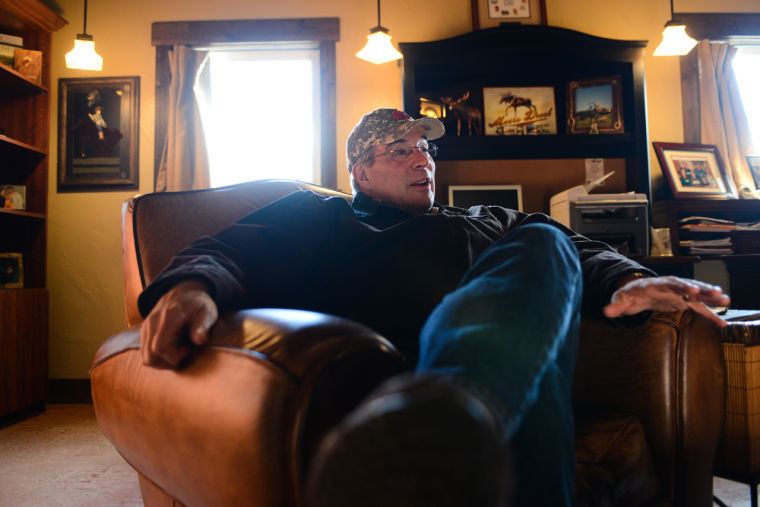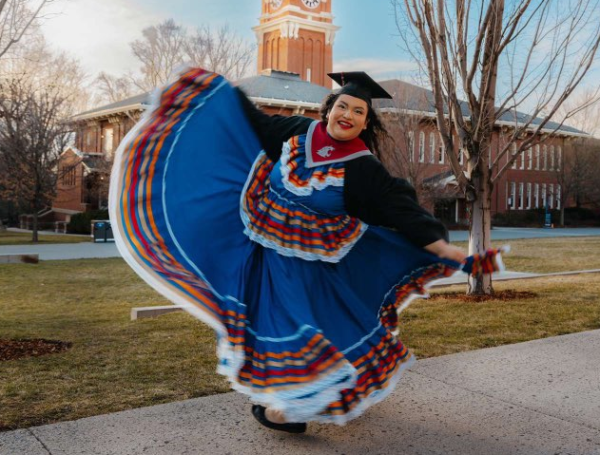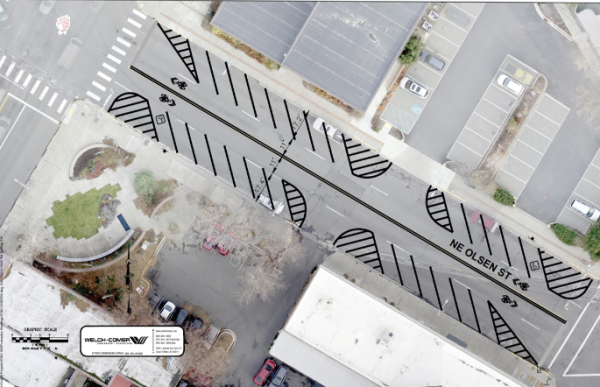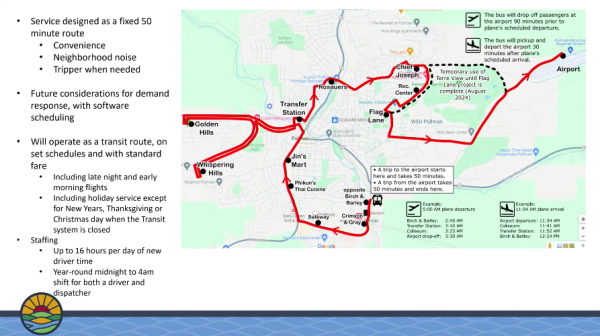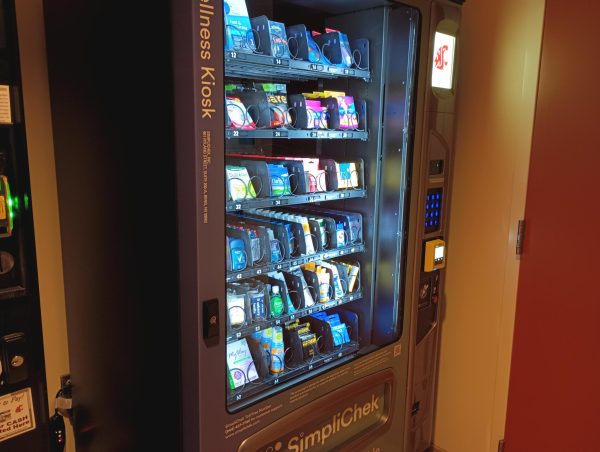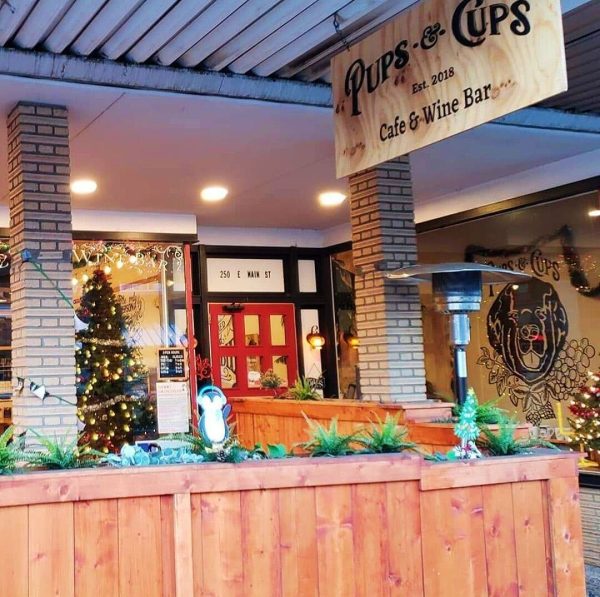Moos goes back to his ranching roots
December 6, 2013
Stepping out into the pasture freshly dusted in snow, Bill Moos paused a moment.
Behind him sat the white wooden barn he and his wife built; ahead of him lay the acres of land and rolling hills on which he raises cattle in eastern Washington.
Layers of blue jean, muck boots, work gloves, and Cougar cap sheltered him from the frigid air as he fired up his tractor and loaded a bale of hay.
“I was raised on a wheat and cattle ranch. All I ever wanted to be as a young boy growing up was an athlete and a cowboy,” Moos said. “I have been in athletics all my life, and I thought it would be good to go be a cowboy for a while.”
Fans know him as the athletic director (AD) at Washington State University, but on this 60-acre ranch Moos fulfills his desire to manage a herd of grass-fed, hormone-free cattle.
Moos, 62, said he and his family bought Special K Ranch (SKR) in Valley Ford, Wash., in the 90s. Together they cut the roads, dug the wells, built the structures, and placed the fences.
After he left the University of Oregon in 2007, Moos and his family moved out to the ranch to raise cattle.
“My roots, when you get right to it, are country,” he said.
Even while now leading in the AD position at WSU since 2010, Moos still makes the 70-minute drive north from Pullman almost every Monday.
For him, the ranch acts as a diversion from the demands of collegiate athletics.
“I can clear my head up here, very quiet, never hear a car or see a person,” he said. “You can sort a lot of things out when you’re fixing fence or on a tractor or herding the steers.”
However, balancing his job as athletics director, as a cattle rancher, and as a father of five, Bill looks to his wife Kendra for unfailing support.
A partner in life
Married for 25 years, Kendra and Bill have worked together through three university athletic director positions, several moves, and the upbringing of their children, Kaiti, Brittany, Christa, Bo, and Ben.
Brittany and Christa now have families of their own, Kaiti studies screen writing as a freshman at Loyola Marymount University in Los Angeles, Bo works for Pac-12 Networks, and Ben attends Pullman High School as a freshman.
Bill and Kendra met in the late 1980s in Pullman while Bill worked as the Cougar Club director and Kendra as a registered nurse at the local hospital. After studying history at WSU and playing offensive tackle for the football team, he worked in Washington, D.C., where he had the chance to attend Watergate hearings for then President Richard Nixon.
He had returned to Pullman to pursue athletics.
Kendra said they immediately clicked, her and Bill. Laughing, she remembered him asking her out on three more dates while still on their first date.
But it was a scavenger hunt she went on with him and his athletics department friends that showed her the man she eventually married. Separated in different cars that night, Kendra said she felt uncomfortable with unfamiliar people.
“I can remember Bill coming up and saying, ‘I want her to be with me.’ He just took over in such a kind way, very much a gentleman,” she said. “That was something that solidified his character to me, always very concerned and compassionate.”
In turn, when describing his wife Bill doesn’t hesitate.
“Well she’s beautiful,” he said, smiling. “She’s got high standards, hardworking and is dedicated to family.”
Bill said when he met Kendra she already had two daughters, Christa and Brittany, from a previous marriage. But, he knew they were a package deal.
“Those are my girls. They carry my name. I gave them away when they got married,” he said. “But I had to learn to be a dad on the go because with a snap of the finger, I say ‘I do’ and I’m an instant dad.”
Five children and six grandchildren later, he and Kendra value the experiences they shared as a family in the athletics business.
Kendra is tough, Bill said.
“She’s a good trooper because when you’re in the business I’m in with regards to athletics, you have to be a bit of a nomad,” he said.
The AD positions started in 1990 at the University of Montana in Missoula, moved to the University of Oregon in Eugene, and have now settled at WSU in Pullman.
“I decided working outside of the home with my husband gone 200 days out of the year, there needs to be a constant at home,” Kendra said. “My kids need to have a place to come that’s not chaos 24/7, and that’s what life can be if you don’t watch out.”
Often with a baby on one hip, Kendra would support her children in their individual sports. Bill also made it a priority to support his children, like Bo who played football at number 61, which was Bill’s number when he played for the Cougars in the early 1970s.
Now with just Ben, a freshman at Pullman High School, the two have the time to build a family business of their own.
The ranch
Kaiti Moos, Bill and Kendra’s second youngest, recalls the adventures on SKR. She learned how to prepare for anything during the record-setting snowfall of 2008.
“My mom insisted that we go to the Christmas Eve service. We went all the way down, and the church was closed because it was so bad,” Kaiti said. “We had to get out of the car and hike a fourth of a mile back to the ranch. My older brother thought he had hypothermia.”
Her dad’s love of western movies, particularly John Wayne films, inspired her interest in screenwriting.
“I think seeing those old movies really got me interested in films to begin with, but it was also special to see the passion my dad had for cattle ranching,” she said.
Each year, the ranch picks 12 to15 newly weaned cattle from Bill’s family’s 12,000-acre farm in Edwall, Wash., in October. The cows start at around 500 pounds. By late August or early fall, the cattle hit 1,100 to 1,200 pounds.
They graze on brome, orchard, timothy, and blue grasses along with alfalfa. Cows don’t naturally eat the corn some producers use to fatten the meat, but depending on the customers’ desire for more fat and marbling, SKR will finish by feeding their cattle healthier barley.
The farm grows all its own feed, Kendra said.
Teresa Emtman, one of the Moos’ neighbors whose family owns Emtman Brothers Farms, occasionally lends a hand with her husband at Special K Ranch.
In the beef industry, Emtman said her family works about 300 head of grass-fed cattle a year. Unlike SKR who sell to butcher, they usually sell their bulls for breeding, but now butcher some because of the increase in demand for grass-fed.
“The grain-fed is more on the fattier side,” she said. “If you butcher beef off a ranch you get one DNA; if you buy (hamburger) from a store it can be multiple.”
SKR values the quality of non-commercial cattle raising practices, Kendra said.
“When you have something like our product and like other people who sell our kind of product, you know exactly what you’re getting,” she said. “You’re getting that one steer that you have paid for.”
In the fall, Kendra takes the steers to Sandpoint, Idaho, for butchering at a United States Department of Agriculture certified site. When selling to restaurants like the Dockside at Coeur d’Alene Resort or Birch & Barley in Pullman, sanitary practice is paramount, she said.
“We sell at $4.45 a pound, and that’s cut, wrapped and delivered,” she said.
According to the U.S. Department of Labor Statistics/Consumer Price Index, the retail rate for lean or extra-lean ground beef this year is about $4.805 per pound.
SKR supplies restaurants and individual clients across the Pacific Northwest.
Back to the job
At WSU, President Elson S. Floyd values the strides Bill has made as the athletics director.
“Together we are going to continue to build intercollegiate athletics at WSU,” Floyd said. “We are going to do everything we can to keep (Bill) here because I think that continuity is important when you are trying to build a program.”
For Bill, getting back into the business was the right choice.
“Kendra kept saying, ‘You’ve got one more in you, you’re not ready,’” Bill said. “I argued with her, and after that couple of years said, ‘Once again, she’s right.’”
Bill said SKR does not take away from his duties at WSU. He said the grind of everyday life can taint judgment if people don’t pay attention.
SKR provides a place for him to evaluate his choices.
“A lot of things you see in Cougar Athletics today came to me when I was sitting on a John Deere tractor,” Bill said. “I could venture to say I’m better at what I do at Washington State because I’ve got a place to go to where I can think about decisions and be able to step away from it.”
After three years, Floyd has had the chance to work with Bill professionally and get to know him personally. He said he has enjoyed visiting the ranch, having dinner with Bill and Kendra, and listening to the cattle stories.
“He is who you see,” Floyd said. “He’s deeply committed to his family, of course he’s committed to WSU, but he’s very much a family man.”
Bill said he has taken the blueprints of the program he designed at Oregon to develop a plan for growing WSU’s athletics program. He intends to see the plan through his 2020 contract.
“There would be no greater legacy that I could leave than to establish a winning tradition at my alma mater,” he said.
A cowboy once more
While Kendra plans to host weddings and events in the barn, Bill expects to grow the cattle numbers on the farm to 20 or 25.
They won’t build until Bill retires in seven years, and retirement will still prove an adventure for the Moos family.
But even after two harsh winters, Kendra knows she and Bill have no regrets about SKR.
“It’s fulfilling, it’s a simple life, really,” she said. “It’s not the pace of college athletics.”
Bill said he always wanted to have his own ranch. Now he has it, right back where he started.
“Now here I am in my early 60s back at Washington State working at my alma mater,” he said. “Also, I’m back to my roots, on this cattle ranch.”


